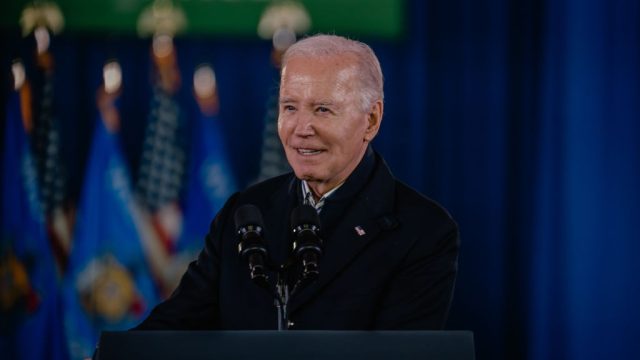
As the race for the White House draws ever closer, President Joe Biden will likely look to tout his legislative agenda as fuel to propel him to a second term, but there is one area of uncertainty looming over voters: the economy.
The Biden administration has been working to stabilize the economy following a period of rampant inflation, and the efforts do appear to be working; even The Wall Street Journal — with its often conservative editorial board— noted that “stock prices are booming, the job market is strong and inflation is falling in the U.S.” Despite this, Biden does not seem to be gaining political points — while polls show that consumer confidence is growing, overall polling on Biden’s handling of the economy remains low.
As a result, the Biden administration will likely make the economy one of the key messages — if not the key message — of the president’s reelection bid this year. How will the president address his economic agenda and track record leading up to the election?
There are ‘a lot of politics at play’
The White House has recently been extolling key economic indicators such as slowing inflation, high job growth and low unemployment levels, all of which are good signs heading into 2024. But that “really isn’t filtering down to how Americans feel about the economy,” NPR senior political editor Domenico Montanaro said on “Morning Edition.”
Most people “just don’t think people look at this in a macroeconomics kind of way,” Montanaro opined. “When people see big signs with gas prices higher than they’d like, and when they see that their bill at the checkout counter in the grocery store is $20, $30 higher than they’d paid, you know, say, a year or two ago, then that stings.” But it isn’t just pricing, Montanaro added. “There’s a lot of politics at play here, too … when a new administration comes in, there’s been a sharp reversal in perceptions of the economy by party.”
“Voters are unhappy about the state of the economy, even though, by most measures, it’s doing great,” economic opinion columnist Peter Coy wrote for The New York Times. This is because there seems to be a “disconnect between good numbers and bad vibes,” economist Paul Krugman added for the Times. Beyond political partisanship, it is a longstanding fact that “while economists tend to focus on relatively recent inflation, people tend to compare prices with what they were some time in the past,” Krugman said.
“Perceptions of inflation are filtered through politics,” Coy concluded. “Food and gasoline are more expensive for Trump supporters than Biden supporters, if you believe what people tell pollsters. That’s not going to change between now and November.”
A fundamental reframing
A recent study from the progressive think tank Way to Win concluded that Democrats should “reframe the discussion to tangible, personal economic concerns.” The think tank noted that voters “are moved by what impacts them, not economic abstractions,” and many Americans are still feeling the negative effects of price gouging.
Democrats “cannot win the debate over the economy without fundamentally reframing the terms of the choice they are offering voters,” editor Ronald Brownstein wrote for The Atlantic, which published Way to Win’s study. While the White House has spent months trying to win over voters with the president’s “Bidenomics” agenda, the study argues that it’s counterproductive “to try to convince voters that inflation is abating or that the economy is improving while so many are struggling to make ends meet,” Brownstein noted.
Veteran political pollster Stanley Greenberg agreed, saying that “reciting accomplishments doesn’t move [voters]” in a recent memo obtained by the Los Angeles Times. “Democrats talking about this strong economy and things moving in the right direction [sound like they] are talking about a different country.” Rather, Biden and his administration officials should “talk only about high prices, what we have done and how we are going to help going forward, and try to win the cost-of-living argument,” Greenberg opined.
Greenberg, who helped former President Bill Clinton’s campaigns in the 1990s, added that the cost of living should be first on Biden’s agenda in 2024. “It’s the only issue for Gen Z, millennials, unmarried women and white working-class voters under 50,” Greenberg concluded.
The president has consistently battled low approval ratings around his handling of the economy




